2013 Jewel Heart Spring Retreat
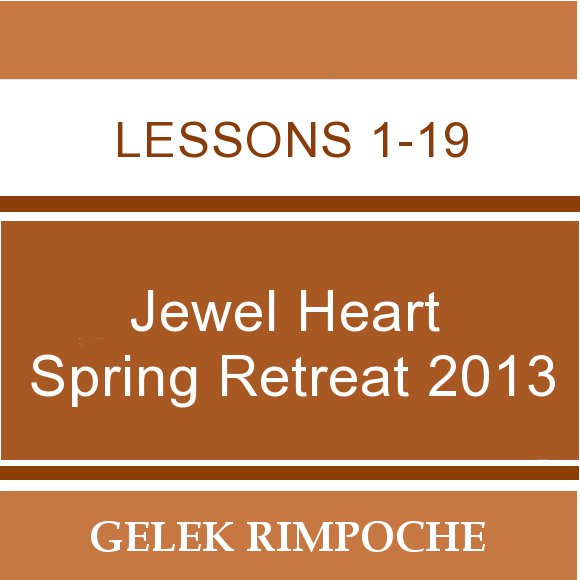
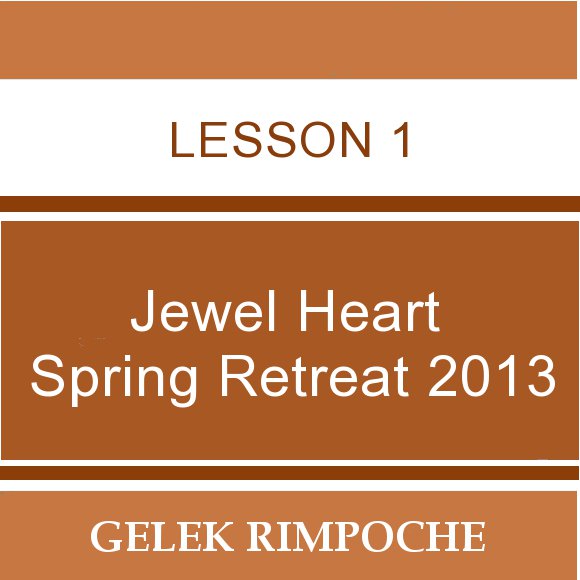
2013 Jewel Heart Spring Retreat Lesson 1
Lesson Number 1 of 19
What does being a Buddhist mean? Not just from the point of view of studying dharma texts, which is wonderful and necessary, but in a personal and practical way — the things we do or are expected to do? The familiar activities of sleeping and waking are places from which to begin to address this important question. For Buddhist practitioners, sleep represents a continuity with waking life. Applying even just a little awareness when preparing to go to sleep directs the mind toward virtue and away from attachment, obsession, anger, jealousy and similar afflictive states. Positive motivation is as important at the end of the day as at the beginning. (18:43)
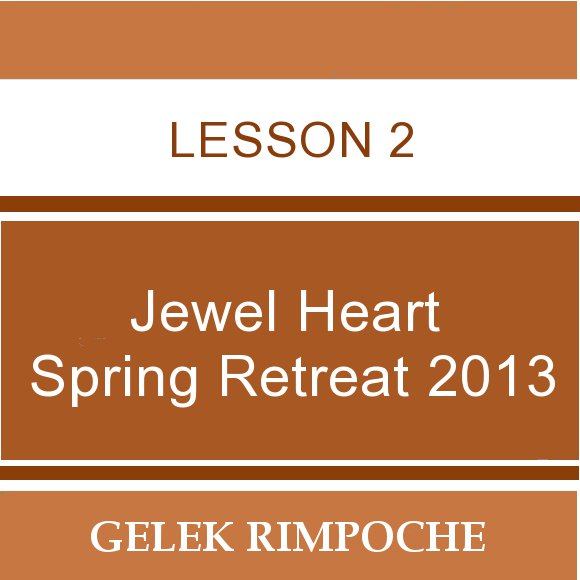
2013 Jewel Heart Spring Retreat Lesson 2
Lesson Number 2 of 19
Awaking from sleep presents an important motivating opportunity for all practitioners. At the most basic level, there’s gratitude for the gift of a new day full of life and awareness. From this develops a strong determination not to waste this human life. Sensing the urgency of the situation, we take refuge in Buddha, Dharma and Sangha, confident in their ability to help, particularly when their significance and function are correctly understood. (26:23)
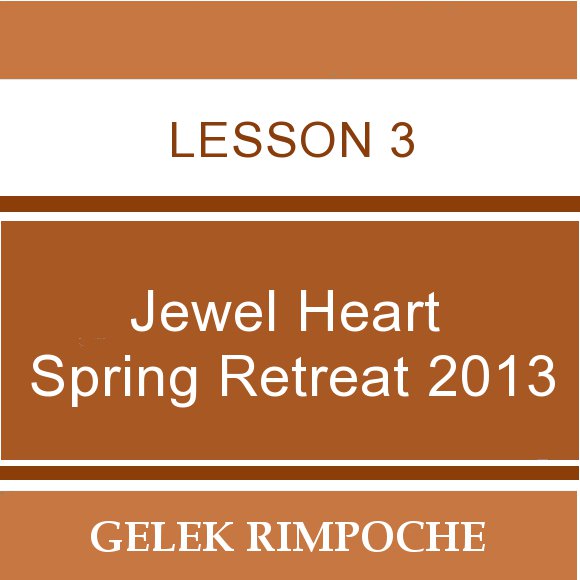
2013 Jewel Heart Spring Retreat Lesson 3
Lesson Number 3 of 19
As sentient human beings we have a tremendous capability to achieve our spiritual goals. But this capability is obscured when the mind is controlled by negative thoughts that lead us repeatedly toward delusion and suffering. A first step to correct this tendency is to manage or organize the mind so that it becomes available to positive motivation. This includes bringing our understanding of the ultimate goal into a clearer and more personal focus. Buddhahood, far from being something cultural, from the distant past, or beyond our reach, is very close to each of us and ultimately attainable. (30:05)
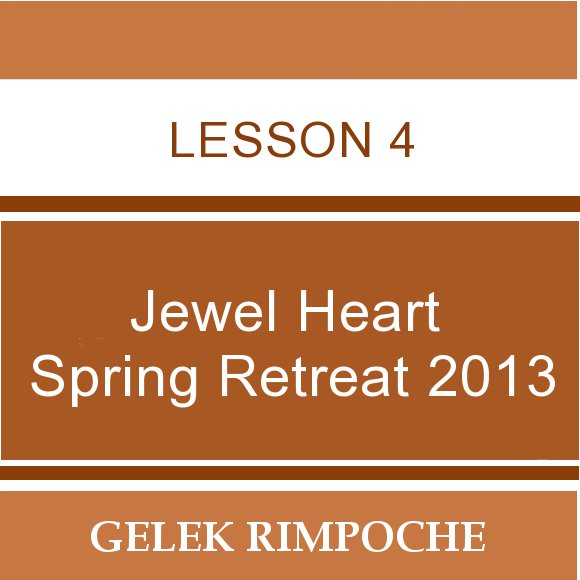
2013 Jewel Heart Spring Retreat Lesson 4
Lesson Number 4 of 19
Bodhimind is the gateway to Buddhahood, the essence of the Mahayana path. The Mahayana motivation far exceeds the needs of any single person — its goal is the enlightenment of all sentient beings without exception. It draws upon unconditional love and compassion, as represented in our everyday lives by the unwavering devotion of a mother for her child. Implicit in bodhimind is a profound and permeating awareness that the wellbeing of others is more important than my own. (31:45)
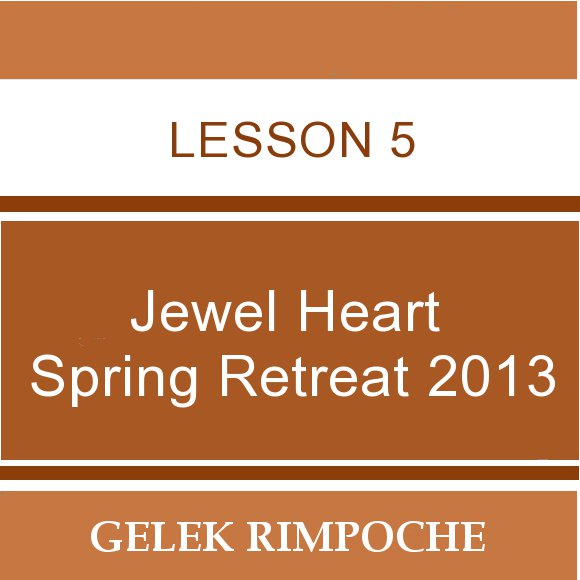
2013 Jewel Heart Spring Retreat Lesson 5
Lesson Number 5 of 19
The four Buddhist seals — conditioned existence is impermanent; deluded experiences are suffering; phenomena are empty; nirvana is peace —are the basic principles shared by all Buddhists. They direct us away from samsara (a state of internal suffering or dissatisfaction caused by ignorance) toward nirvana through an experiential understanding of impermanence and emptiness. To this, Mahayana Buddhism adds the all-inclusive goal of Buddhahood or total enlightenment, a profound motivation to help all sentient beings. (14:51)
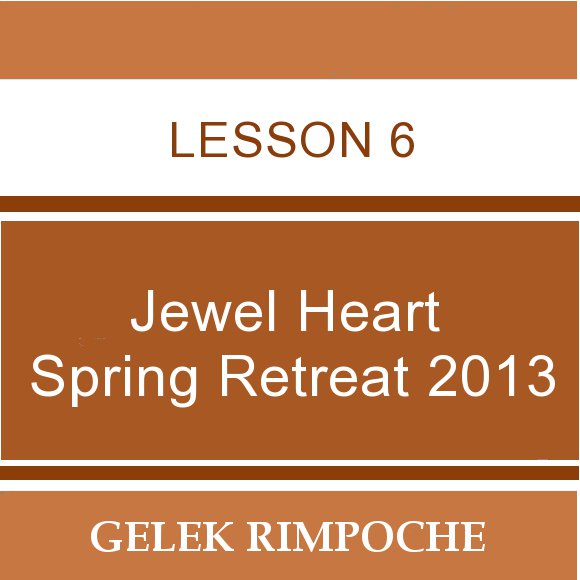
2013 Jewel Heart Spring Retreat Lesson 6
Lesson Number 6 of 19
Extending compassion beyond ourselves to all other suffering beings is the path that leads beyond nirvana toward total enlightenment. The challenge is to prevent this compassion from becoming watered down as we seek to make it limitless. This requires love. A strong desire for total knowledge, supported by compassion and love, ultimately becomes bodhimind — a genuinely heartfelt state capable of huge positive results. (19:06)
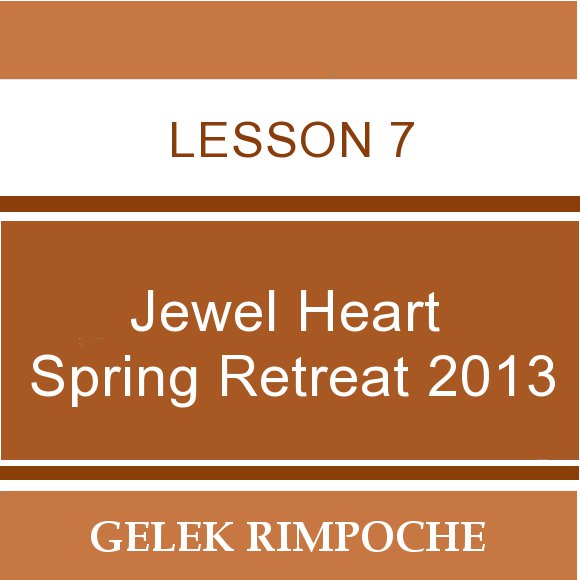
2013 Jewel Heart Spring Retreat Lesson 7
Lesson Number 7 of 19
In essence, the goal for Buddhist practitioners consists of two related activities: accumulating positive deeds and getting rid of negative karma. The Seven Limb practice lays out a path to attain these ends. In applying the Seven Limb practice, it’s important to recognize that the mental aspect is more important than the recitation of words. In the Invocation, when the Merit Field is invited to help, no separation should be seen between Buddha, guru, yidams, dharmapalas, dakas, dakinis, arhats and bodhisattvas. They are all one. (16:56)
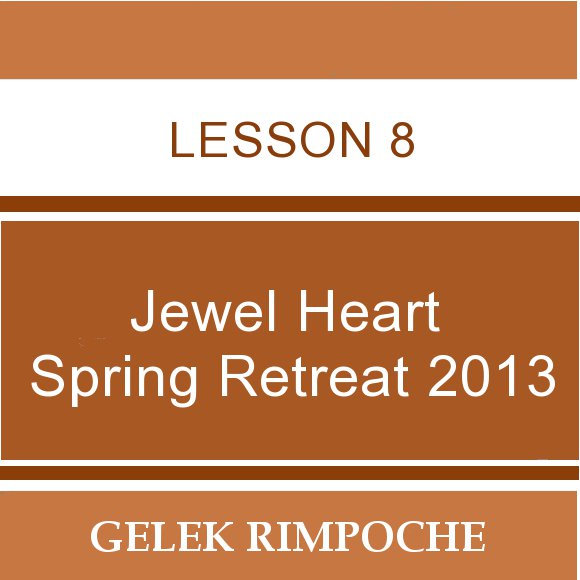
2013 Jewel Heart Spring Retreat Lesson 8
Lesson Number 8 of 19
Prostration, the first of the Seven Limb practices, is a way of giving respect or honoring the quality of Guru, Buddha and Dharma. The second limb, offering, is an act of generosity, the antidote to stinginess. Mentally, we must learn to let go of habitual clinging that holds back our spiritual development. Generosity is about letting go. (13:34)
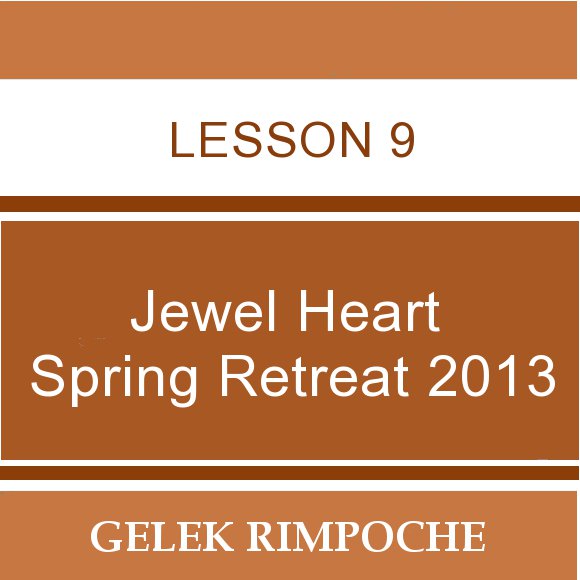
2013 Jewel Heart Spring Retreat Lesson 9
Lesson Number 9 of 19
Responding to audience questions, Rimpoche clarifies a series of distinctions: between equality and equanimity; prayer and meditation; causal and result Buddha; and causal and result refuge. (17:37)
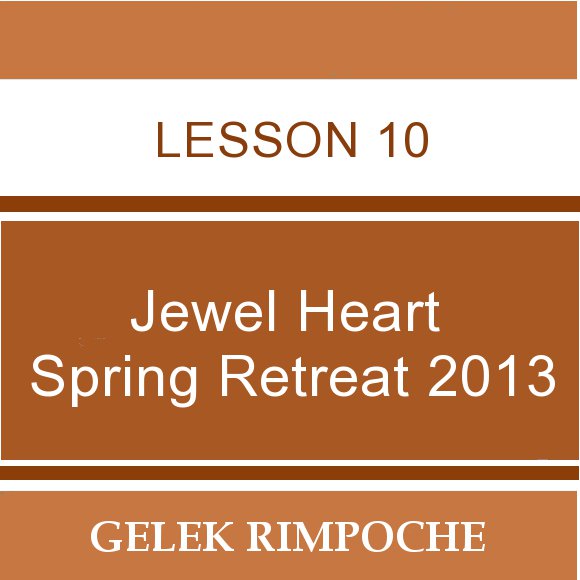
2013 Jewel Heart Spring Retreat Lesson 10
Lesson Number 10 of 19
Continuing to address questions, Rimpoche discusses the factors included in correct or perfect action, how to apply skillful means to actions, distinguishing between good and bad karmic results in relation to wealth, and the role of honesty in responding compassionately to others’ needs. (18:13)
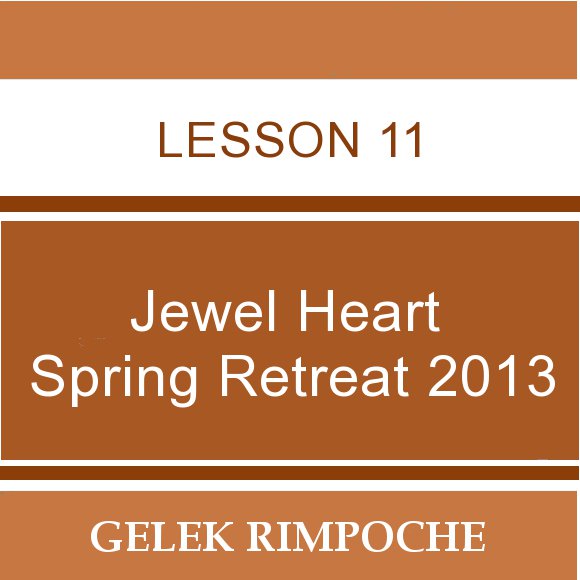
2013 Jewel Heart Spring Retreat Lesson 11
Lesson Number 11 of 19
Rimpoche concludes his survey of the Seven Limbs: rejoicing in the achievements of others; requesting the teachings to remain; and requesting guidance. This practice embraces the essential requirements of accumulating merit and purification. (07:52)
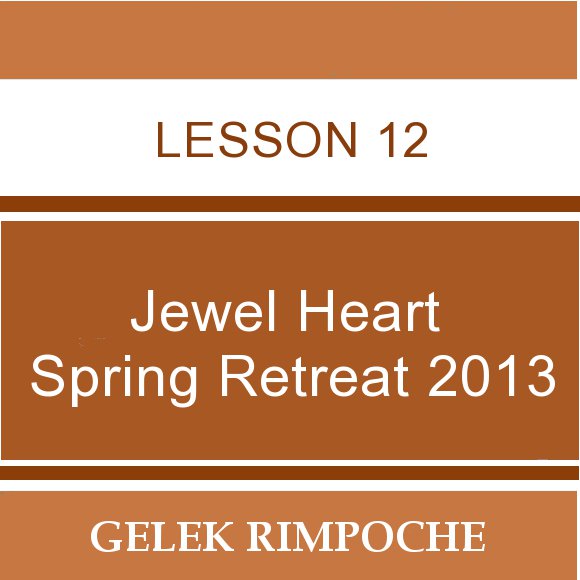
2013 Jewel Heart Spring Retreat Lesson 12
Lesson Number 12 of 19
Mantras are central to the Jewel Heart prayers. Mantras typically begin with “Om” and end with “Hum” or “Soha” and are one of the deepest meditations. Sound rather than literal meaning is key to a mantra’s effectiveness. This is why mantras are not translated but instead are preserved in the original Sanskrit. (26:09)
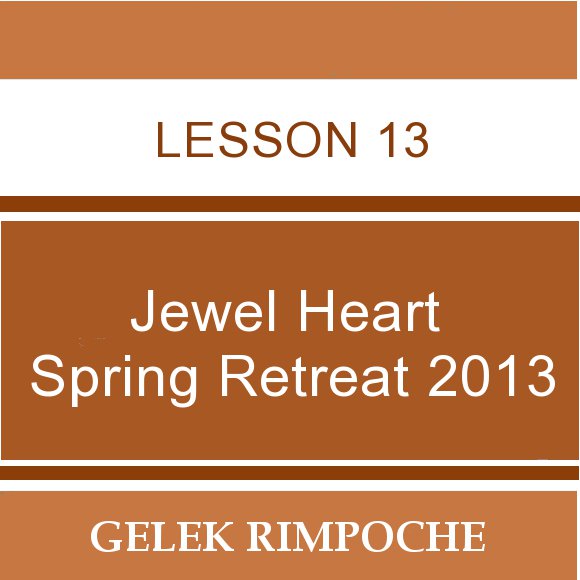
2013 Jewel Heart Spring Retreat Lesson 13
Lesson Number 13 of 19
Tibetan Buddhism is Mahayana Buddhism and mostly, though not exclusively, Vajrayana Buddhism. Definitions of Tibetan Buddhism include the two principals of love/compassion and wisdom, the two sets of five powers related to life and living and death and dying, and the three levels of practice or Three Principles of the Path. (16:51)
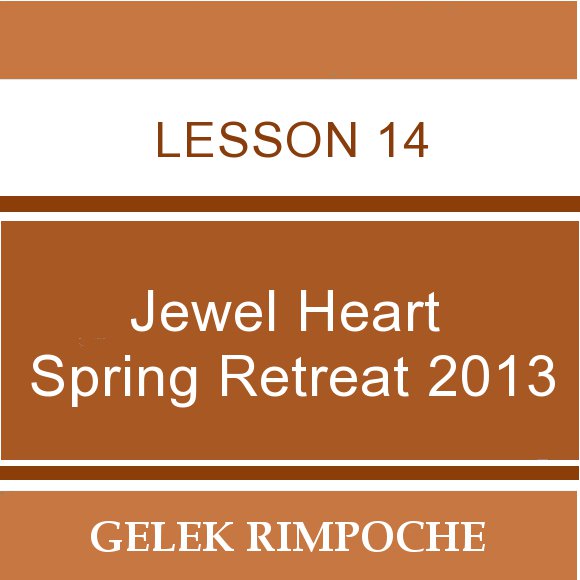
2013 Jewel Heart Spring Retreat Lesson 14
Lesson Number 14 of 19
Renouncing samsara, the first of the Three Principles of the Path, involves a very personal recognition of how one is “stuck” in delusional life. Each of us is snared in samsara in our own individual way: there is no single, common-to-all samsara. We may be involved in good works and practice virtue — all positive and necessary activities — yet the samsaric “glue” deep within the hidden recesses of the mind holds us in its grip. Renunciation begins with this recognition. (11:04)
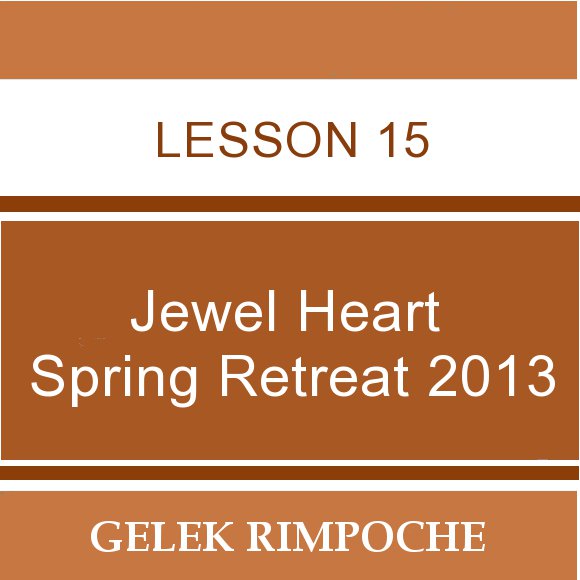
2013 Jewel Heart Spring Retreat Lesson 15
Lesson Number 15 of 19
Wisdom is the third of the Three Principles of the Path. Understood as dependent origination, it is the gateway to individual awareness of emptiness. Impermanence is not emptiness, but brings us closer to an understanding of emptiness. Development of bodhimind is also important for achieving wisdom. The Five Powers provide a framework for our lives: the power of the positive or white seed; the power of prayer; the power of the antidote; the power of determination; and the power of familiarity with the awakened heart and mind. (17:06)
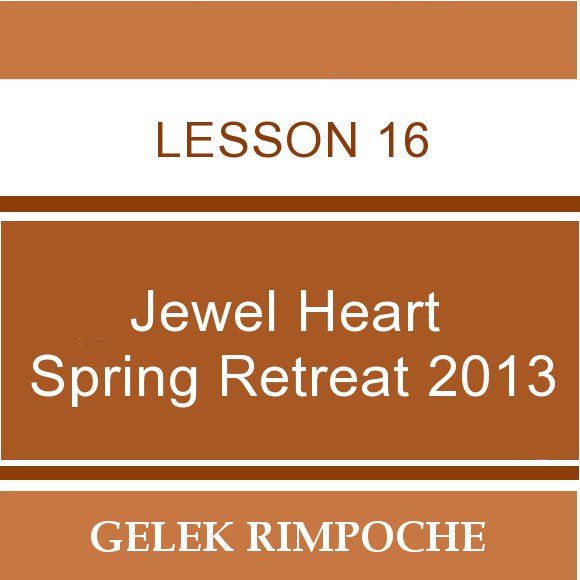
2013 Jewel Heart Spring Retreat Lesson 16
Lesson Number 16 of 19
This Q&A session covers common characteristics of the realms of samsaric gods, humans and hungry ghosts; purity of mind in relation to a correct understanding of emptiness; and an extensive discussion of the interconnected mechanisms of collective and individual karma. (26:00)
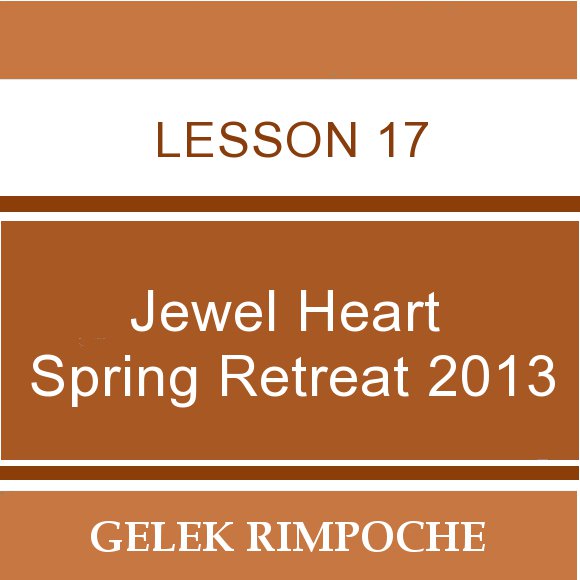
2013 Jewel Heart Spring Retreat Lesson 17
Lesson Number 17 of 19
The Q&A continues with discussion of the power of the white seed; what it is that is purified through the purification practice; the imprinting of karmic results from one life to another; avoiding attachment when developing love-compassion for others; the possibility of generosity in a feudal society; and the distinction in ritual speech between dharani and mantra. (23:08)
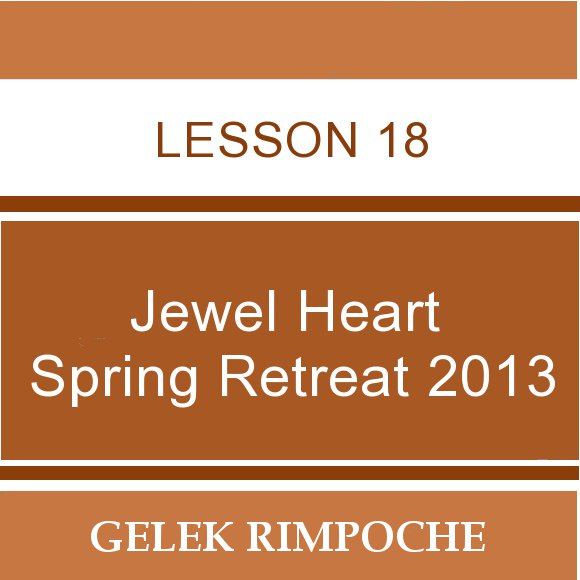
2013 Jewel Heart Spring Retreat Lesson 18
Lesson Number 18 of 19
Bodhimind is rooted in compassion and love. Attachment may, on the surface, appear similar to love, but its focus is on “me” and “my” needs rather than the needs of others. Pure love, on the other hand, is simple appreciation untainted by the desire to own or control. Fortunately for us, the mind is capable of change. By developing equanimity, we can reduce hatred, increase love and compassion and smooth out the roughness of our thoughts. (14:41)
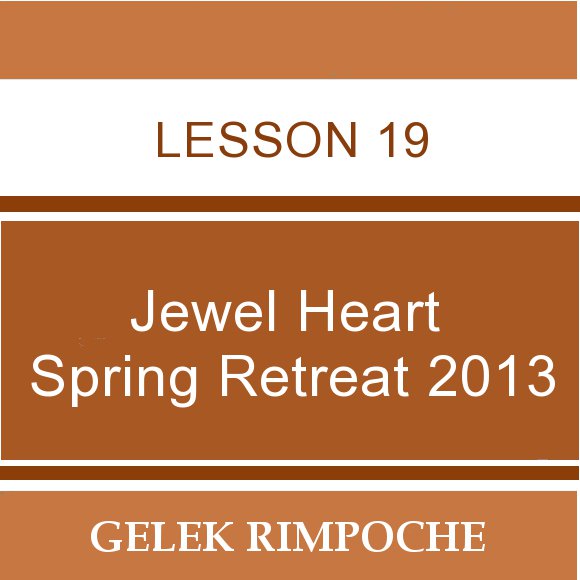
2013 Jewel Heart Spring Retreat Lesson 19
Lesson Number 19 of 19
Through the teachings of Buddha and Tsongkhapa, we have the power to achieve total enlightenment. Short of that, we may still attain freedom from suffering or, at the very least, a purposeful life and death. This is a very rare opportunity we should not waste. The Five Powers mentioned earlier — motivation, white seed, familiarization, antidote and prayer — will help us realize this opportunity. (14:30)

